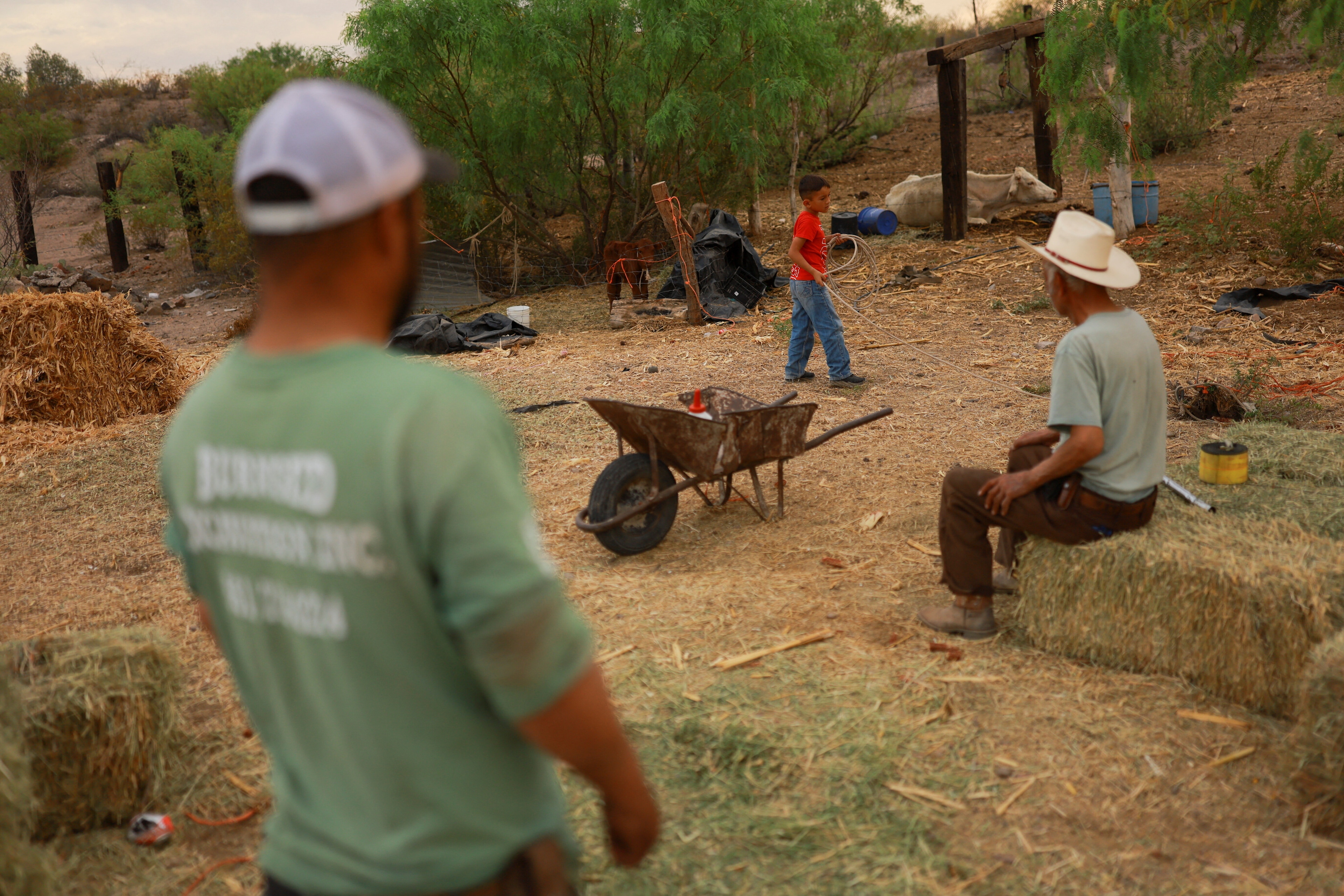New era of climate action diplomacy in the Middle East

US Special Presidential Envoy for Climate John Kerry speaks alongside UAE Special Envoy for Climate Change.
Image: REUTERS.
Stay up to date:
Middle East and North Africa
Listen to the article
- The United Arab Emirates recently hosted the Regional Dialogue for Climate Action Summit.
- Leaders from MENA, the US and the UK, committed to key climate issues such as reducing emissions and investing in a new energy economy.
- Regional collaboration is key to tackling climate change and enabling sustainable development.
As President Biden and Vice President Harris return the US to the international climate stage, they face scepticism about their ability to not only deliver on targets, but take action at home and create long-term, reliable partnerships internationally.
Most countries welcomed the US back to the table, and the new administration began to re-establish its leadership on this issue with Middle East countries during the last two months – making it a signature policy of renewed American foreign policy in the Middle East. Of course, in the past the main interests for the US and Western allies in the region were in counterterrorism and arms deals. The recent meetings between the US Presidential Envoy for Climate, John Kerry, and the UK’s COP26 President Alok Sharma, demonstrates that the new common interest is climate change.
New leadership for climate action in the Middle East
The new leadership in the Middle East countries includes the recent announcement of UAE's Special Envoy for Climate Change. The UAE announced the Minister of Industry and Advanced Technology, Dr Sultan Al Jaber, as the UAE's Special Envoy for Climate Change in November 2020, followed by Qatar announcing the Special Envoy of the Minister of Foreign Affairs for Climate Change and Sustainability, Mr Bader Omar al-Dafa.
In April this year the United Arab Emirates (UAE) hosted the Regional Dialogue for Climate Action Summit – with John Kerry, Alok Sharma and leaders from across the Middle East and North Africa (MENA) region – vowing to accelerate progress on climate targets.
The summit concluded with the following commitments: reduce emissions by 2030 and beyond; work collectively to help the region adapt to the serious impacts of climate change; collaborate on mobilizing investment in a new energy economy; pursue respective efforts to mobilizing climate finance. The participants also committed to the Paris Agreement and the upcoming COP26 UN Climate Change Conference in Glasgow, Scotland this November.
Leaders of four Middle East and North African (MENA) countries were invited to the recently held US Leader’s Summit on Climate – Saudi Arabia, UAE, Turkey and Israel – who collectively represent 40% of the region’s greenhouse gas emissions and just under 3.5% of global emissions. Also, the new Net Zero Producers Forum – co-founded by the US, Saudi, Qatari, Norwegian and Canadian governments – launched with an agenda to tackle methane and carbon emissions in the oil and gas sector. Although details are unclear now, for Saudi Arabia and Qatar this appears to be in line with their existing plans for technologies such as carbon capture, usage, and storage (CCUS) and an aim to improve their image as clean hydrocarbons exporters.
Ahead of the US Leader’s Summit on Climate, Saudi Arabia announced two ambitious climate initiatives: the Saudi Green Initiative and the Middle East Green Initiative which includes: promises to reduce emissions by 4% (equivalent of the global total); increase its share of renewable energy in electricity generation from 0.3% to 50% by 2030; planting 10 billion trees over the coming decades with clear carbon sequestration benefits; and implementing “clean hydrocarbon" projects.
What’s the World Economic Forum doing about climate change?
Also, last year UAE submitted their enhanced Nationally Determined Contributions (NDCs) with intentions to reduce its GHG emissions by 2030 by 23.5%, relative to the business-as-usual scenario and consistent with the approach adopted under Article 4.7 of the Paris Agreement. The UAE’s climate ambition is underpinned by the country’s steady economic diversification which is yielding benefits for both climate mitigation and adaptation.
Meanwhile Qatar is developing the Al Kharsaah Solar PV IPP Project, a 800 megawatt-peak (MWp) solar plant that will be located 80km west of Doha. The project was awarded to a consortium of Total (49%) and Marubeni (51%) as the result of the country’s first solar tender. State-owned Qatar Petroleum released its new sustainability strategy report, which established several targets in line with the goals of the Paris Agreement. The plans include a reduction in GHG emissions by 2030. The report also claims to reduce the emissions intensity of the country’s LNG facilities by 25% and of its upstream facilities by at least 15%. It also wants to reduce flare intensity across upstream facilities by over 75%.
The regional discussions between Middle East countries after the Biden Administration’s visit have been very progressive. John Kerry returned to the UAE following the Leader’s Summit on Climate in Washington in April, to rally progress ahead of COP26 followed by his latest trip to the Middle East for talks with Saudi ministers, officials, and CEOs on a range of climate-related issues. Kerry praised the Saudi Green Initiative as “a very important step,” adding that it is “the kind of initiative we that we need on a global basis.”
These recent regional meetings are providing a constructive platform for Middle East countries to collaborate on responses to climate change and enhance global climate ambitions. They enable leaders in the region to discuss ways in which they can initiate a new low-carbon development path and enhance cooperation with the international community to transform climate challenges into economic opportunities.
New era of climate diplomacy
The Middle East region has enormous potential to tackle the global challenges of climate change, if the region can maximize and leverage the latest technologies and focus smart investment to ensure truly sustainable development, that facilitates economic growth and further commitment to reducing emission levels by 2030.
By working collectively to help the region adapt to the serious effects of climate change, and collaborating on mobilizing investment in a new energy economy and initiatives that cover several core issues, such as: stepping up the deployment of renewable energy; exploring the potential of new zero-carbon energy sources; maximizing the effect of mitigation technologies, including investments in innovative new and emerging solutions as well as carbon capture; and reducing the carbon-emission intensity of hydrocarbon fuels. Further enhanced cooperation between the Gulf countries and the West can usher in a new age of climate diplomacy in the foreign agenda.
Ahead of COP26, with the current progress on climate commitments in the region and with enhanced NDCs, new net-zero commitments come at a crucial time.
The UAE recently announced that it will host the COP28 International Conference on Climate Change in 2023. For now, clear climate leadership and diplomacy in the Gulf countries reflects wider regional dynamics and geopolitics. If current commitments and actions match further ambitions, then then the region will lead global action on climate change.
(Neeshad Shafi is a Global Shaper in the Doha Hub.)
Don't miss any update on this topic
Create a free account and access your personalized content collection with our latest publications and analyses.
License and Republishing
World Economic Forum articles may be republished in accordance with the Creative Commons Attribution-NonCommercial-NoDerivatives 4.0 International Public License, and in accordance with our Terms of Use.
The views expressed in this article are those of the author alone and not the World Economic Forum.
Related topics:
Forum Stories newsletter
Bringing you weekly curated insights and analysis on the global issues that matter.
More on Climate ActionSee all
Michael Wang
July 28, 2025
Naoko Tochibayashi
July 28, 2025
Jose Ignacio Galindo and Nicolas Wertheimer
July 24, 2025
David Elliott
July 22, 2025



